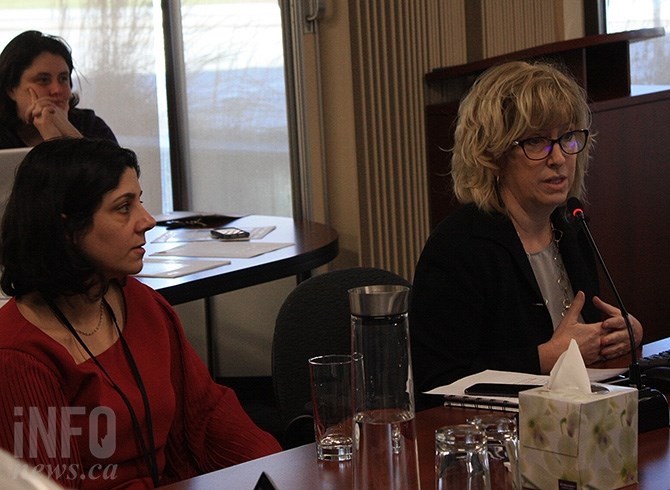
Regional district directors heard first hand of the region's opioid crisis from Interior Health representatives Dr. Silvena Mema and Administrator Rae Samson at today's Hospital Board Committee meeting, Jan. 18, 2018.
(STEVE ARSTAD / iNFOnews.ca)
January 18, 2018 - 6:00 PM
PENTICTON - The severity of the region’s opioid crisis was brought home to regional directors this afternoon.
The Interior Health region is the second highest for overdose deaths in the province, with fentanyl the reason behind 90 per cent of those deaths, board members heard at the regular meeting today, Jan. 18.
Interior Health Medical Health Officer Dr. Silvina Mema and Administrator Rae Samson presented the latest statistics and answered questions from board members as they discussed the crisis for the first time.
Mema said while health officials were making progress in finding ways to prevent overdose deaths, there was no good news from the coroner as regional statistics have soared over the past 10 years.
Only the health authority of Vancouver Coastal has more overdose deaths than Interior Health, where the Okanagan has seen deaths jump from 13 in 2007 to 126 in 2017.
The Thompson Cariboo has seen deaths climb from 16 to 55 in the same period, reaching across all social backgrounds and classes.
Mema said Kamloops statistics have stabilized in the past year, and research was being conducted to find out what practises there might be contributing to that trend.
Samson noted Interior Health has distributed 3,800 take home Naloxone kits and have conducted 12,000 clinic visits at mobile supervised consumption services in their efforts to reduce harm. She said further treatment involved community follow up of overdose patients brought into hospital emergency wards, provision of intensive case management and out-patient addiction services, and the establishment of awareness and anti-stigma campaigns about drug use.
Samson said it was important that Interior Health’s four priority communities - Kelowna, Vernon, Kamloops and Penticton - had a strong base of services where people have access to a family doctor and a continuing outreach worker or counsellor.
“You’ve got some quite exceptional services within the community, with services like the Martin Street clinic,” she told the board. She said the health authority was trying to get doctors to increase subscribers of Suboxone, a substitution therapy which helps stabilize those addicted to opiates.
Samson also noted Kamloops Royal Inland Hospital was starting overdose patients on suboxone while in emergency.
“Kelowna is very interested in that and we’ll also be working with that in Penticton,” she said.
Penticton director Helena Konanz noted many Penticton residents don’t have a family doctor and also pointed to a lack of psychiatrists in the city.
“It’s not reinventing the wheel, it’s just some basic services into the regional district,” she said, also asking if the health authority would consult local government if it has plans to open any safe injection sites in the city.
“You’re right, it’s a struggle. Access to doctors is a problem, and doctors don’t have the time when we come to them and ask them to prescribe suboxone, as they are busy with regular patients needing complex care," Mema acknowledged.
“Part of the reason for developing the Martin Street clinic originally was exactly to address that,” added Samson. She said Penticton had good access to opiate therapies that was “quick, relative to the province,” as well as having exceptional housing programs compared to other communities.”
Penticton director Andrew Jakubeit asked if Interior Health had a perspective regarding comparative death rates from other causes, such as obesity or smoking, over the 10 year period.
Mema said although she didn’t have numbers at hand, she believed overdose deaths had increased far beyond statistics relating to other causes of death.
To contact a reporter for this story, email Steve Arstad or call 250-488-3065 or email the editor. You can also submit photos, videos or news tips to the newsroom and be entered to win a monthly prize draw.
We welcome your comments and opinions on our stories but play nice. We won't censor or delete comments unless they contain off-topic statements or links, unnecessary vulgarity, false facts, spam or obviously fake profiles. If you have any concerns about what you see in comments, email the editor in the link above.
News from © iNFOnews, 2018